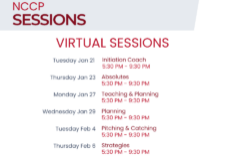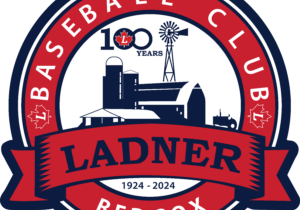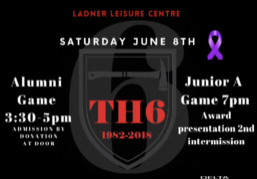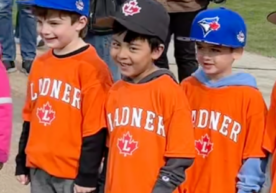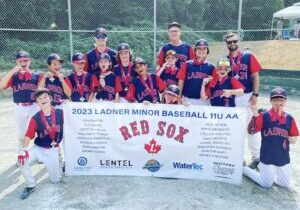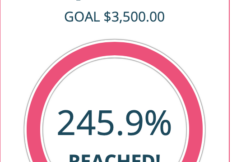11U - Mosquito Division Overview
Overview
2025 Season birth years: 2014 and 2015
The 11U (Mosquito) Division offers a full recreational spring program for any interested player. LMBA also offers competitive programs in spring (MSET) and summer for players who are selected to participate.
Base paths are set at 60 feet and a regulation hard ball is used. No lead offs are allowed and players cannot steal until the ball crosses the plate. “Live” pitching is used throughout the 6 inning games. A 1st year pitcher (or pitchers) must pitch the first 2 innings per game. Pitching limits follow the LMBA and BC Minor pitching rules.
11U AAA Summer Ball
11U AA Summer Ball
11U A Summer Ball
10U A Summer Ball
All of the LMBA 11U (Mosquito) programs begin with involvement in our spring season. Players must participate fully in this program to be eligible for the MSET or summer ball program.
Players will require the following equipment/apparel:
- baseball glove
- cleats
- helmet with chin strap
- protective jock/jill
- grey baseball pants (any other color is not permitted in spring season)
- bat - max 2 3/4" diameter, unlimited drop, max 32" length - bats with greater than 2 1/4 in barrel diameter must be marked "USABB" or stamped with BPF 1.15" (Bat Performance Factor)
All BC Minor Baseball rules will be in effect but LMBA rules take precedence if there is any difference.
Expectations of Players, Coaches, Fans at all LMBA games
- Coaches are responsible for the behaviour of their team players, fans and parents during games and to make sure there is no abuse of umpires or the equipment. INAPPROPRIATE LANGUAGE AND BEHAVIOUR WILL NOT BE TOLERATED. An umpire may direct a coach to deal with (a) fan(s) that they believe are being inappropriate. It is the responsibility of the coach to notify the division manager of any issues that occur at the ballpark immediately following the game and/or practice.
- Coaches and/or Players may NOT:
- Argue any umpire’s decision. The umpire’s call is final.
- Approach an Umpire during or after a game at any time.
- Harass or verbally abuse any official on the field of play before, during or after any game.
- Coaches and players not complying with this may be subject to ejection. All ejections are reported to the LMBA Executive and will be dealt with accordingly.
- Coaches that have an issue with a (the) umpire(s) will complete the online umpire evaluation form and provide as much information as possible regarding the situation(s) that need addressing. The Umpire-in-Chief will follow up on the evaluation.
- There shall be no spectators behind home plate, except for the official team scorekeeper and pitch counter. Spectators are permitted to be in the stands or in the outfield. Spectators are not to sit where the teams are set up.
- Spectators are to refrain from coming into the player's area (dugouts/ area surrounding the dugout). This is done out of respect for the players and the coaches.
- There shall be no use of cameras (phone or otherwise) on the playing field during the game unless being used for the purposes of the LMBA.
- Players will be warned once about throwing of bats, helmets, etc. The second occurrence could result in ejection by the Umpire (Umpire decision).
- Each team is responsible for cleaning up their dugout area after their games and practices.
Game Play - General
1. The Field
- Base paths are set at 60 feet. The distance between home plate and the pitcher’s rubber is 46 feet.
- The baseball field is the area enclosed within the baseball fence. Anything within this playing area is “in-bounds”; anything outside of the fenced area is “out of bounds” or “dead ball territory”.
- The first base and third base lines extend from home plate all the way to the outfield fence. These lines determine if a hit is fair or foul. The area between (and including) the foul lines is fair territory, while anything outside them is foul.
- The infield is the dirt area of the field. An infield player is a player whose position is based in the infield.
- The outfield is the grass area of the field. An outfield player is a player whose position is based in the outfield. Outfield players must start in the outfield but can come into the infield to make a play.
- Should a team not be able to use the dugouts, players will set up a temporary dugout/players’ area along the first and third baseline.
2. Game length
- Game length is two (2) hours after the schedule start time
- No inning to start later than one hour and forty-five minutes after the actual game start time.
- If there is another game scheduled afterwards, or if the umpire decides it is too dark to play safely, the game may be called (Umpire’s decision), and game score reverts to the previous completed inning played.
- If the home team is at bat and the time passes the two (2) hour mark, the inning should be completed if possible (Umpire’s decision).
- in the event of weather or darkness, four innings will constitute a complete game.
3. Runs per inning
- For the first two (2) innings of all games, a half inning will end when either two (2) runs are scored, or three (3) outs occur.
- For innings three (3) through five (5), a half inning will end when either four (4) runs are scored, or three (3) outs occur.
- For inning six (6) or last lining will be declared open by the umpire and will only end when three (3) outs occur, or the mercy rule takes effect.
- The first two innings of every Mosquito game will be limited to a maximum run count of two (2) runs per team per inning. Innings three (3) through five (5) will have a maximum run count of four (4) runs per team per inning. Inning six (6), or last inning declared by the umpire due to time limit or darkness, will be an open inning with no maximum run limit.
4. Mercy rule
- A ten (10) run mercy rule is in effect after 5 or more innings (4 1⁄2 innings if home team is leading).
5. Players
- Fair Play Rule: No player shall sit out more than one (1) inning consecutively and a maximum of two (2) innings per game.
- The only exception is for injury or discipline reasons.
- In the case of an extra inning game, this rule will apply separately to each set of six innings in succession.
- If a player cannot play defensively, they must come out of the game.
- All players are to remain in the dugout or on the benches at all times when their team is at bat except the on-deck batter. Players warming up to return to the defensive line-up can do so in the out of bounds area nearest their dugout.
- Infield Positions: Players are allowed to play a maximum of four (4) innings infield, of which only one position may be played twice.
- The only positions exempt from this is the pitcher and catcher.Your pitcher and catcher may occupy the position for a maximum of three (3) innings each. Only two (2) of the innings played at pitcher and catcher will count towards their infield time.
E.g. If Bob plays three innings at catcher, Bob can still play one (1) inning at 1st base and one (1) inning at 3rd base.
- The only positions exempt from this is the pitcher and catcher.Your pitcher and catcher may occupy the position for a maximum of three (3) innings each. Only two (2) of the innings played at pitcher and catcher will count towards their infield time.
- Outfield positions: Players shall be allowed to play a maximum of three (3) innings per game. All outfield positions are considered to be the same position.
6. Pitching
- All BC Minor and LMBA pitching rules are in effect.
- Coaches or players must warm up pitchers only. A catcher’s mask must be worn when warming up a pitcher.
- Number of Pitches & Required Rest from start of season to end of May long weekend:
- 1 - 25 pitches = no rest
- Number of Pitches & Required Rest from Tuesday following May long weekend to end of spring season:
-
- 1 – 25 pitches = no rest
- 26 - 40 pitches = 2 nights rest
- 41- 55 pitches = 3 nights rest
- 56 - 65 pitches = 4 nights rest
- 66 - 75 pitches = 5 nights rest
- Pitchers may only pitch on three (3) consecutive days if their combined total for days 1 and 2 do not exceed 25 pitches and games are during spring tournaments, summer, single seasons or Provincials.
- Pitchers may not pitch on four (4) consecutive days.
- Maximum number of innings a player can pitch in one game is three (3) innings. A player who pitches three (3) innings in a game may not pitch at all in his team’s next game regardless of when that game is scheduled.
- A rainout or delayed/suspended game will not affect the pitching regarding the 2 or 3 nights rest rule, so any pitcher who was ineligible to pitch when the game was originally supposed to start shall remain ineligible when the game is played.
- The first two innings of each game must be pitched by a first-year player defined as a player who did not play in the 11U (Mosquito) Division in a previous year, and who is eligible to play one more year in the 11U (Mosquito) Division.
- Wild pitch rule: pitcher hits 2 players in one game—pitcher will be removed from the mound unless the umpire determines that the batter could have avoided being hit through a reasonable effort (Umpire’s decision).
- Balks are not called except as follows:
- When with runners on base, the pitcher fails to deliver the pitch after beginning his pitching motion, the umpire shall call, “Time…no pitch”. The umpire shall relate to the pitcher that he must deliver the ball without stopping his motion as this is a ball. No runners may advance on the call. Any subsequent failure to deliver the pitch after starting his motion, the umpire shall call “Time, ball”, and then charge the pitcher with a ball. No runners may advance on the ball.
Note: The intent of this rule is to prevent pitchers from stopping their delivery to home plate when they see a batter square to bunt.
- Coaches may visit the mound once per inning per pitcher. If exceeded, the pitcher must be replaced.
- Once a pitcher is removed from pitching in a game, they cannot re-enter the pitching position during that game.
7. Batting
- All players are to bat (i.e. placed in the batting order line up).
- Players who arrive late will be added to the bottom of the line-up.
- The batter is out on the third strike whether the ball is caught or not. The ball is live and runners may attempt to advance.
- Bunting is allowed.
- The infield fly rule is not in effect (i.e. Umpires shall not call an automatic out).
8. Base Running
- On an overthrow to first or third base that goes into out of bounds territory, the runners will advance one base beyond the last base he was attempting to reach or had safely reached when the overthrow was made.
- The ball is in play so long as it remains inside the fenced area of the ball field and runners may continue to advance.
- Stealing a base is allowed, but lead offs are not allowed. Runners may not leave the base until the ball has crossed home plate. The penalty for a runner leaving early is the runner is to be called out (Umpire’s Decision). The ball is live, and play shall continue as if there was no lead off.
- Runners cannot steal while the pitcher is on the rubber and in the pitching position with the ball in his possession.
- No stealing of home is allowed in the first two innings. The only two (2) ways a player can score in the first two innings is if forced in by a walk or the continuation of a play beginning with a hit ball.
- Slide or avoid rule is in effect.
- No headfirst sliding unless being forced back to a base. Penalty is an automatic out.
9. Use of 9U (Tadpole) players
- Second year Tadpole players will be eligible to play if a team is short of players, so long as it does not conflict with their own Tadpole scheduled game.
- BC Minor limits 5 regular season games plus one tournament for Tadpole player eligibility in the 11U (Mosquito) Division, and has stiff penalties for violations.
- Teams are encouraged to call up second year Tadpole players when they have 9 or less players available for a game.
- Coaches are requested to ask for permission to use a player from both the Tadpole player’s coach and the 9U (Tadpole) Division Manager before asking a Tadpole player to play in an 11U (Mosquito) game. The 11U (Mosquito) Division Manager may be asked to assist in these situations.
- The 9U (Tadpole) coach or Division Manager is permitted to deny a request if the game conflicts with their own team’s game or if the player is injured or is currently serving a disciplinary suspension with their own team.
- Tadpole players must wear their regular team uniform when playing 11U (Mosquito) games.
- Tadpole players are not allowed to pitch in the 11U (Mosquito) division.
Coaches
- Each team is allowed a maximum of three (3) coaches inside the fenced perimeter once game play commences. Coaches must remain in the dugout area unless their team is on the offence, and they are occupying a coaches’ box. This is out of respect for the other team and their coaches.
- Each team may have an unlimited number of coaches; however, those exempt from completing further volunteer hours will be determined by LMBA at the start of each season.
- Only those individuals who have completed their Criminal Record Check and have registered as a helper are permitted to work with the players on the field.
- The head coach will meet with the opposing coach and the umpires at home plate 5 minutes prior to the scheduled game time. The coaches will introduce themselves by their first name to the umpires and will present the team lineup sheet/batting order (2 copies) to the home plate umpire. The home team will give their lineup sheets to the umpire first.
- No protests are allowed during league play. If you have an issue, please notify the 11U (Mosquito) Division Manager.
Uniforms and Equipment
- Spring Season jerseys and hats that are supplied by the league must be worn to all games.
- Shirts are to be tucked in at all times.
- Players are to wear grey baseball pants. NO summer ball/all-star gear is to be worn during spring league play.
- Players are not permitted to wear any additional clothing that covers their team jerseys. This includes jackets. Any additional clothing must be worn underneath the jersey.
- It is mandatory that all players wear athletic supporters.
- Players are to wear rubber cleats; metal cleats are not allowed.
- As per BC Minor Rule 19.02 Helmets - batters, on deck batters, players used as base coaches, or batboys in all age categories shall wear double earflap helmets which give protection to the temple, ears, base of skull, and top of the hat. Skull caps and wraparound headgear are not to be used by any player as so defined.
- For divisions 13U and younger all player helmets must have a chinstrap or have been manufactured with a c-flap (chin protector) and not contain the snaps for a chin strap.
- All players, coaches and team managers are not permitted to wear any clothing other than described in BC Minor Rule 19.06:
- Conventional baseball uniforms including a shirt, pants, and socks.
- Coaches must wear at least a team cap in Spring season play.
- Managers or coaches occupying a coach’s box must be dressed in full uniform except that they will be allowed to wear matching pullovers, cage jackets or warm-up jackets and colour coordinated long pants.
- NO SHORTS, NO SLEEVELESS SHIRTS AND NO CUT OUT SLEEVES JERSEY.
- Coaches and Managers found not to be adhering with this rule will not be allowed on the field during the game.
- Equipment is NOT to be used for any activity that is not an LMBA sanctioned event. Only the coaches and the executive will be given access to the equipment boxes.
- A league provided hardball is used during gameplay.
Game Scheduling
- Games are not to be postponed or rescheduled without the agreement of the 11U (Mosquito) Division Manager and both impacted head coaches.
- Teams are not to consider a game canceled due to bad weather unless they are officially notified.
- Minimum game cancellation notification time is 1 ¾ hours before game time start.
Home Team Responsibilities
- The home team is responsible for notifying the umpire allocator, concession manager, and the division manager of any game cancellations, postponements, or re-scheduling.
- The home team is responsible for preparing the diamond by lining the field and filling in any depressions before the game. After the game, they are to make sure all equipment used during the game is returned to the bins and locked up. No children are allowed in the equipment room or bins.
- The home team is responsible for bringing two LMBA provided game balls to the umpire at the start of each game.
The 2024 MSET program is a spring season competitive program currently being developed in conjunction with other local associations and further information will be shared shortly. We are planning for two teams: one for the 2013 birth year and one for the 2014 birth year. These teams will only be formed if there is enough interest.
Rosters will be larger than the standard team size as players and coaches must attend their spring team commitments if there is a conflict.
It is anticipated that ~4-6 games will be scheduled along with weekly training sessions. A possible tournament option is being explored that may be local or out of town tournament dependent on the opportunities that are open for this season.
Players will be required to indicate their interest in being considered. All registered players for the spring season will be asked if they are interested in the MSET program.
Note: The spring season evaluations will also serve as the evaluations for the MSET program. All interested players must ensure they attend the spring season evaluation.
The MSET program is completely separate from the summer ball program. MSET players are not provided with a place on any summer ball team through their participation with MSET. Players who play MSET are not required to try out for summer ball.
All information regarding the 2025 Tom Henderson Tournament can be found here.
LMBA strives to provide the opportunity for as many interested players as possible to play in the competitive summer ball program, however rosters will be limited and we do not guarantee all players who try out will be assigned to a summer ball team.
This program requires a separate registration and a full tryout process which will take place shortly after the May long weekend. More information will be provided to all registered participants in the LMBA spring season in late April/early May.
The summer ball program requires a high level of commitment from the players. Families are asked to take this into consideration when planning summer vacations. BC Minor provincial weekend in particular should be avoided as a minimum number of 12 players is required for the team to play in the tournament.
A, AA, AAA Divisions
For 11U, we are planning to operate three teams for the 2024 season.
- AAA Division - open to 2013 and 2014 birth year players, this team is comprised of the highest skilled players in the entire division that opt to play at the AAA level.
- A Division - open to 2014 birth year players only, this team is typically comprised of the highest skilled 2013 players who do not tryout for and make the AAA team.
- AA Division - open to 2013 and 2014 birth year players, this team can be comprised of the following:
- any player who does not wish to play at the AAA or A level of competition. All players must participate in either the AAA or A tryouts to be considered but they can indicate on their registration form if they are only interested in playing at the AA level. The level of commitment is consistent to the other divisions, but the level of competition may be a choice some families prefer.
- any player who is not selected to join the AAA or A teams will be considered for the AA team.
Cost:
There is an additional cost to participate in the summer ball program to cover the cost of umpire fees, game balls and team specific costs. The association will cover the entry fee cost of one tournament plus the entry fee for any team that qualifies for the Provincial Championship. The team will cover the entry fee cost for the second tournament. Any travel costs will be covered by the player's family on an individual basis. Teams are encouraged to seek sponsorships to offset costs and/or add to the team experience.
Commitment required
All players who make a summer ball team are expected to attend all team activities: practices, games and tournaments. Families who are considering being involved with summer ball should plan all vacations and other activities accordingly.
Anticipated 2024 schedule:
Post May long weekend: The tryout dates will be confirmed shortly into the start of the spring season. There will be two groups - AAA and A with two sessions for each group. Players should plan to attend both sessions, however they will be assessed based on whatever they do attend.
June: summer ball practices will be scheduled during the month and will not conflict with any spring team activities.
League play: throughout July - note travel within the Lower Mainland/Fraser Valley will be required for ~10 league games.
July tournaments: All three teams will be entered into 1-2 tournaments during July. More details will be confirmed prior to the tryouts so families can understand the commitment as all players are expected to attend all summer ball activities including tournaments.
Provincial Championship: BC Minor typically holds the 11U provincial championships over the August long weekend however it will be confirmed once the host association has confirmed their dates. The number of teams who participate from each zone will be determined based on the overall number of teams across the province and what region hosts the event. Berths are awarded based solely on league results.


